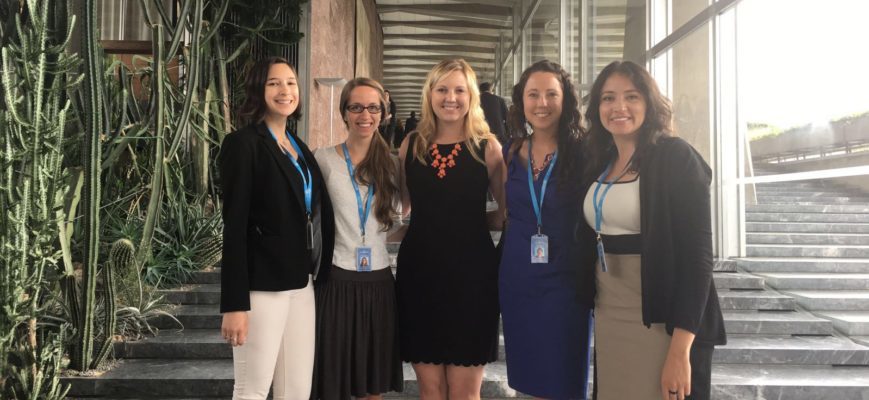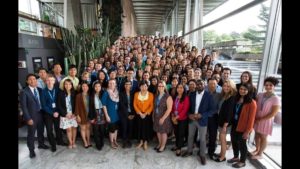
From left, the CSU students who interned at the WHO last summer were Lorenza Cavelier, Natalie Murphy, Christa Timmerman, Kelly Brown and Adriana Romero
When asked what they did on their summer vacation, a handful of CSU students can now say, “Oh, I just addressed global health problems — while touring Europe on the weekends.”
This summer, five master of public health students enrolled in the Colorado School of Public Health at CSU got the rare opportunity to intern at the World Health Organization in Geneva, Switzerland.
One of them, Kelly Brown, researched the challenges that health-care providers face when implementing the Baby-Friendly Hospital Initiative’s recommendations on breastfeeding. Another, Lorenza Cavelier, helped catalogue the spread of a family of diseases transmitted by sand flies in tropical areas.

“I got to understand how the WHO works, and how much influence it has,” said Cavelier, who is completing CSU’s five-year MPH/DVM program. “It really made me appreciate things that I’d learned in class. I definitely saw the correlation between human medicine and animal medicine. We can’t separate the two, and we have to consider the environment, too.”
“I had never considered focusing on global public health, and I loved that setting,” added Brown, who works as a nurse in a natal intensive care unit. “I could see myself pursuing a career in global health.”
An emerging partnership
The WHO internships were made possible by a growing relationship between CSU and the international organization. Kendra Bigsby, assistant director of the ColoradoSPH at CSU, said a relationship had been established with an administrator of the Framework Convention on Tobacco Control, which is housed at the WHO, after several CSU MPH students were accepted into internships there.
Bigsby expanded the ColoradoSPH’s relationships with the organization in summer 2015, when she spent a few days in Geneva meeting with multiple WHO officials to learn about their departments and explain the mission of the school. She proposed that MPH students fulfill their capstone projects and practicums with WHO internships, and helped create a vetting process to ensure that only the best candidates are put forward. MPH students must first apply to ColoradoSPH for the internships, and then the school nominates the most qualified candidates to WHO. So far, ColoradoSPH has also been able to support students who are offered internships with a $2,500 stipend to help cover travel and living expenses.
The approach has proved successful: A sixth CSU intern is based at the WHO offices in Geneva this semester, and a seventh has already been accepted for next summer.
“I’m excited that my three days in Geneva resulted in more opportunities for our MPH students,” Bigsby said. “Being able to intern at the WHO is a once-in-a-lifetime experience, and can make students more marketable for jobs after they graduate. So, now we need to keep up the momentum and continue it into future years.”

Brown in front of Mont Blanc during a hiking trip in France
Work on global issues
In her three-month internship, Brown was charged with reviewing research literature to identify issues that health-care providers are having with the Baby-Friendly Hospital Initiative, which was launched by WHO and the United Nations Children’s Fund in 1991. As part of receiving the Baby-Friendly designation, birthing facilities must implement a set of guidelines called “Ten Steps to Successful Breastfeeding,” which address things like how quickly babies should have skin-to-skin contact with their mothers after birth.
Unfortunately, Brown said, doctors and nurses sometimes struggle with maintaining all 10 of the breastfeeding standards over the long term, and WHO officials are considering amending the guidelines to be more realistically achievable. Her job was to help prepare a research paper about providers’ most common problems with the guidelines, which was presented at a WHO meeting this fall in Florence, Italy.
Cavelier spent her two-month internship focusing on the leishmaniases, a group of diseases that can manifest in different ways, from skin lesions to potentially fatal effects on internal organs. Leishmaniasis is found in tropical regions of the world, and countries’ prevention, diagnosis and treatment efforts vary, Cavelier said. During her time in Geneva she helped gather and record data from the Pan American Health Organization for annual reports on the incidence of the disease — and nations’ responses. It involved being trained on how to use a geographic information system to map the spread of leishmaniasis.
“I learned a lot about the disease and how complicated it is,” Cavelier said.

Free time
But it wasn’t exactly all work and no play. Brown said she traveled every weekend, visiting Spain, Belgium, France, Germany, England and Italy. Her favorite trip? Hiking in the Swiss Alps.
“They have such a great network for interns,” Brown said. “They did a tour every week. I traveled with interns I met from all over the world. I ended up staying with a friend I made over there, and she’s probably going to be a friend the rest of my life.”
In addition to her experiences in Amsterdam, Barcelona and Italy, one of Cavelier’s favorite memories was participating in a time-honored tradition of jumping into the Rhone River from a particular bridge in Geneva.
“People liked to picnic by the river with cheese and wine — and lots of chocolate,” she said. “Being in central Europe was great because we were basically an hour’s flight to so many destinations.”
In addition to Brown and Cavelier, the MPH students who interned at WHO over the summer (and the departments where they were placed) were Natalie Murphy (Nutrition for Health and Development), Adriana Romero (Global Surveillance and Risk Assessment) and Christa Timmerman ( Framework Convention on Tobacco Control). MPH student Allison Scobie is currently interning with the Clean Care is Safer Care Programme, and MPH/DVM student Breanna Beberman will be completing an epidemiology and zoonoses internship with the Department of Global Capacities, Alert and Response next summer.
“Everyone was so kind,” Cavelier said of the experience. “It was a fun, diverse group of people. In any given hour, you could hear people speaking English, French, German and Spanish. And our doctor was adamant about not just giving me busywork. They included me in meetings and discussions. They really wanted us to get something out of it, which I definitely did.”